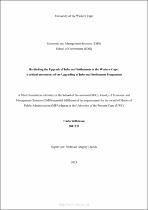Rethinking the upgrade of informal settlements in the Western Cape: a critical assessment of the upgrading of informal settlements programme
Abstract
South Africa is faced with the triple challenge of unemployment, inequality, and poverty. The growth of informal settlements is a manifestation of afore. The first democratic government post 1994 has formulated different policies and strategies aimed at eradication of informal settlements. Despite the efforts, the number of informal settlements had been increasing in most developing countries affected and remains a global challenge to end by the year 2030. Upgrading of Informal Settlements emerged as a human settlements’ strategy in most developing countries, including South Africa. While the core aim of the study is to question why informal settlements are not decreasing, the first aim of the research is (1) to assess the Upgrading of Informal Settlements Programme (UISP) through assessing whether the programme is implemented soundly. A second objective of the study is to determine if government has rethought interventions for the non-qualifying informal settlements residents that influence housing policies. The Upgrading of Informal Settlements Programme will form the basis of the study. The case method was used for the study employing the qualitative research method approach. Qualitative research will be used from the key stakeholder’s responses to understand the experiences and challenges of the UISP phenomena in the Western Cape Province (WCP). The qualitative method approach helps to understand the phenomena better using the key stakeholders’ experiences and interactions with the communities. The study complied the ethical requirements. This study contributed to the knowledge on the housing crisis with an anticipated outcome.

